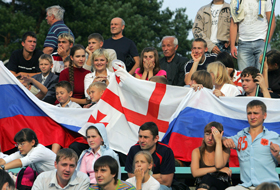Accession of the Georgian Dream opposition alliance to power by way of parliamentary elections gives rise to prospects for sweeping renewal of bilateral relations between Moscow and Tbilisi. Opposition leader Bidzina Ivanishvili made public his intentions “to find points of contact” with Russia, which lie primarily in the spheres of economy and culture. To normalize bilateral ties, he also expressed readiness to revoke a number of anti-Russian foreign policy activities, namely the attempts to disrupt the Olympic Games in Sochi. What is driving this segment of Georgian elite to seek a “reset” in relations with Moscow, and how far both sides are willing to go down this road?
Accession of the Georgian Dream opposition alliance to power by way of parliamentary elections gives rise to prospects for sweeping renewal of bilateral relations between Moscow and Tbilisi. Opposition leader Bidzina Ivanishvili made public his intentions “to find points of contact” with Russia, which lie primarily in the spheres of economy and culture. To normalize bilateral ties, he also expressed readiness to revoke a number of anti-Russian foreign policy activities, namely the attempts to disrupt the Olympic Games in Sochi. What is driving this segment of Georgian elite to seek a “reset” in relations with Moscow, and how far both sides are willing to go down this road?
Georgia and Its Problems
The need for drastic changes in Georgia’s foreign and home policy has been brewing for a long time, since the economic reforms of Mikheil Saakashvili regime came to a dead end. In the nine years following the Rose Revolution, the country received huge foreign grants and loans. By decision of the Donors Conference in Brussels (2004) Georgia was allocated one billion dollars in foreign aid. In 2008, Western assistance amounted to more than five billion dollars.
However, Saakashvili’s team has failed to funnel the funds into competitive economy development. Chaotic neoliberal reforms resulted in the government’s loss of the economic regulation leverage, and the huge influx of cheap currency was used just to stimulate imports. The share of imports in the GDP of Georgia increased from 23.4 percent in 2002 to 45 percent in 2010.
The flow of foreign goods not only damages certain sectors of the Georgian economy, including agriculture, but also leads to the vicious practice of replacing domestic production with imports purchased with non-repayable grants or loans. This approach inevitably brings about debt growth, as the balance of trade is running into a huge deficit to be covered only by more credits. According to the 2011 statistics, the aggregate external debt of Georgia exceeds 77 percent of the national GDP.
Such a situation is extremely dangerous in the long term, as the country becomes dependent upon the flow of politically motivated currency. The refusal of the West to write off previous loans or grant new ones may provoke serious social and economic disruption, and even a political crisis, since the country will lose a significant share of its commodity supply.
The threat could be averted through growth of domestic export-oriented production that should reduce the country's dependence on foreign crediting. However, for economic and geographical reasons Georgia’s vigorous expansion in Western markets in the coming years appears virtually out of question. Russia remains the key potential marketplace for the Georgian economy, but the country lost access to it after the deterioration of bilateral relations in the mid-2000s.
Strictly speaking, the situation in Georgia in many ways is typical for post-Soviet states. On the one hand, many of them require access to Russian markets for the export of their goods and surplus labor, which creates social tensions at home. On the other hand, these countries are interested in financial and military-technical assistance from the Western powers, primarily the U.S.A., whose political interests often run counter to those of Russia.
This explains the emergence of dual-track policy that combines cooperation with Russia and economic integration within the CIS with active political and military collaboration with the United States. This policy was recently clearly demonstrated by Uzbekistan, which has recently suspended its membership in the Collective Security Treaty Organization and began to seek entry to the CIS free trade area. Georgia under Ivanishvili may choose to follow suit.
In the 2000s, the growth rate of per capita GDP of Georgia was one of the lowest in the region, which accounts for the country’s significant lag behind the neighboring states in terms of socio-economic indicators. The return of Georgian products to Russia market could give a new impetus to the development of Georgian economy.
View from Russia
What should Russia expect from changes in Georgia? No doubt, Ivanishvili is ready for certain concessions, namely discontinued broadcasting of anti-Russian First Caucasian information channel, support the Sochi Olympics and other steps, promoting, at the very least, relaxation of tension between Tbilisi and Moscow in the post-Soviet space.
In addition, Ivanishvili is expected to take a milder stance on Abkhazia and South Ossetia. When still candidate for the post of the Minister for Conflict Settlement, Paata Zakareishvili said he would welcome the rapprochement with both republics, unrecognized by Georgia, excluding, however, the recognition per se.
It is important to understand that the move denotes a change of tactics rather than giving up the idea of annexing Abkhazia and South Ossetia. Instead of staking on the military action against the two republics, Georgia might try to reintegrate the non-recognized states by political and economic efforts. Strictly speaking, attempts to follow such a policy were undertaken by the Saakashvili government as well, at least in the form of declarations, which faced immediate criticism on the part of Georgian conservatives.
However, the government of Ivanishvili, free from notorious figures of the previous regime, stands a better chance for success at lulling the partners with soft speaking than the incumbent Georgian President, whose rhetoric has failed to invoke much confidence.
At the same time, it should be understood that the emerging softer Tbilisi’s stand is largely a matter of necessity. Saakashvili’s main mechanism for gaining influence in the former Soviet Union was export of ideology, i.e. promotion of Bendukidze-style neoliberal reforms carried out in Georgia. However, following the opposition’s victory in the 2012 elections, these projects have lost all their appeal. After all, there is no point in trying to export a model that was rejected in the exporting country by both the society and the parliament’s majority party.
Therefore, Ivanishvili cannot help but soften the country’s stance in relations with Russia, as traditional confrontational methods do not seem practicable in the near future.
Meanwhile, the compromise tactics will necessitate certain economic concessions on the part of Moscow, above all, admission of Georgian wines and naturally carbonated mineral water Borjomi to the Russian market. In view of Russia's joining the WTO, such a step seems by no means a must since the disappearance of these products from the Russian shops was formally validated by sanitary restrictions that may as well be quite applicable today.
If Moscow removes the current ban, Georgian business has a chance to win back the niche of Borjomi-type beverages, which is now occupied by producers from North Caucasus and Armenia.
It is not at all improbable that the reluctance of Moscow, Sukhumi and Tskhinvali to welcome Georgian initiatives is explained by the above factors. This, in particular, was testified to by the tough stance of Russia and Abkhazia at the October round of Geneva talks.
Conclusions
Despite ample opportunities for improving bilateral relations between Moscow and Tbilisi after Ivanishvili’s coming to power, feasibility of détente appears uncertain.
The expected change in the Georgian position in many respects may be generated exclusively by economic needs and Tbilisi’s inability to carry out the old policy by the same methods. Russia may have to make real concessions or take steps that would be beneficial mostly to the Georgian side.
In addition, the political situation in Georgia is still uncertain. Despite the transfer of many powers to the Georgian Dream, it is not a fait accompli. Saakashvili is still legitimately heading the state, and before the term of his presidency expires, the situation in the country may change dramatically due to external and internal factors.






